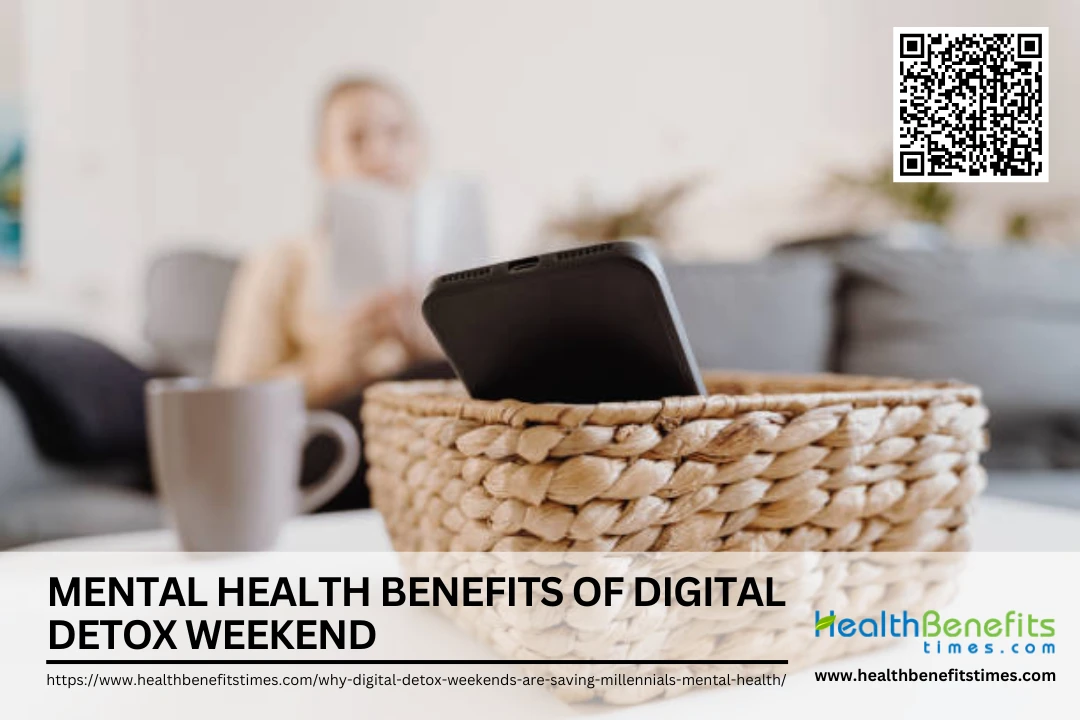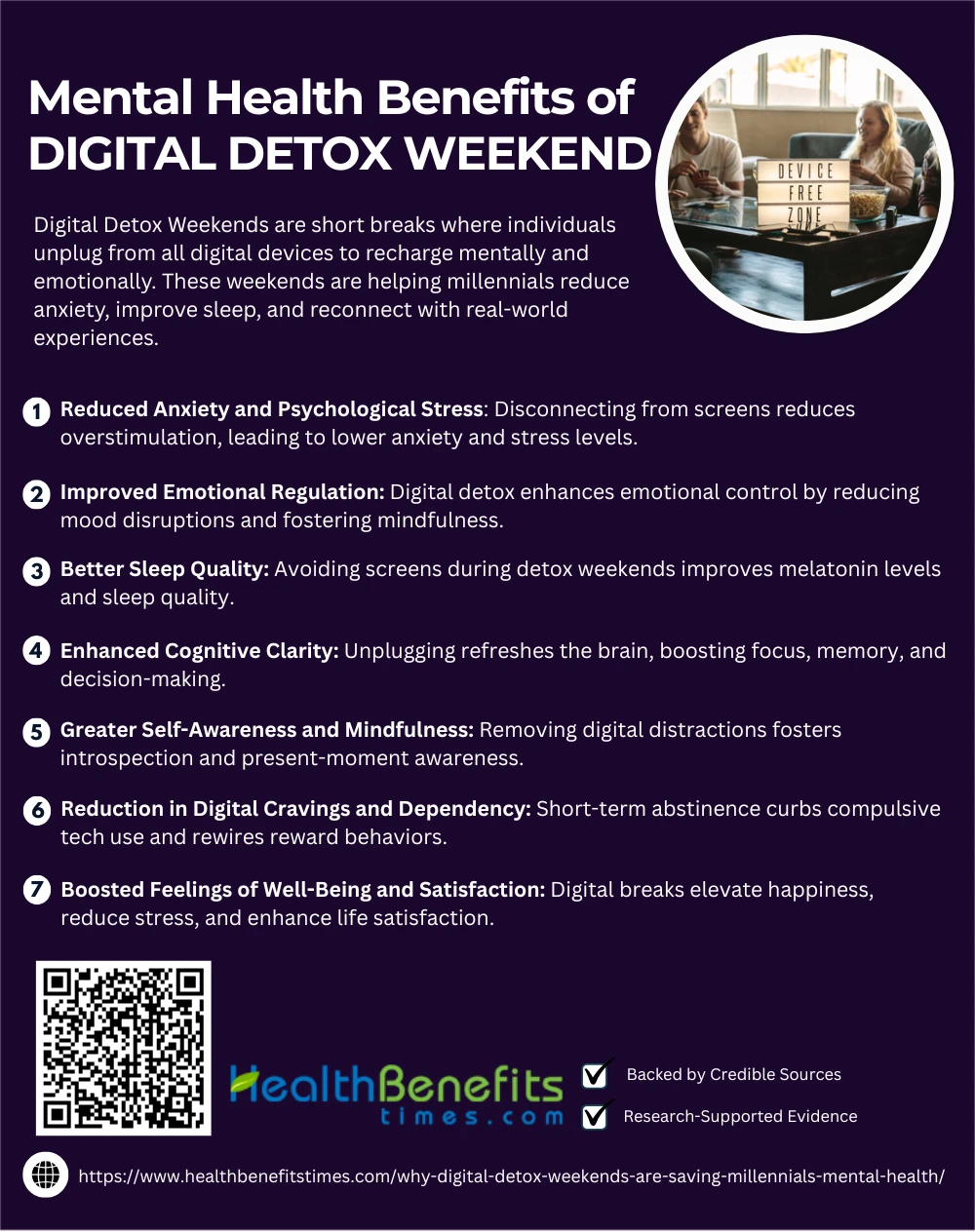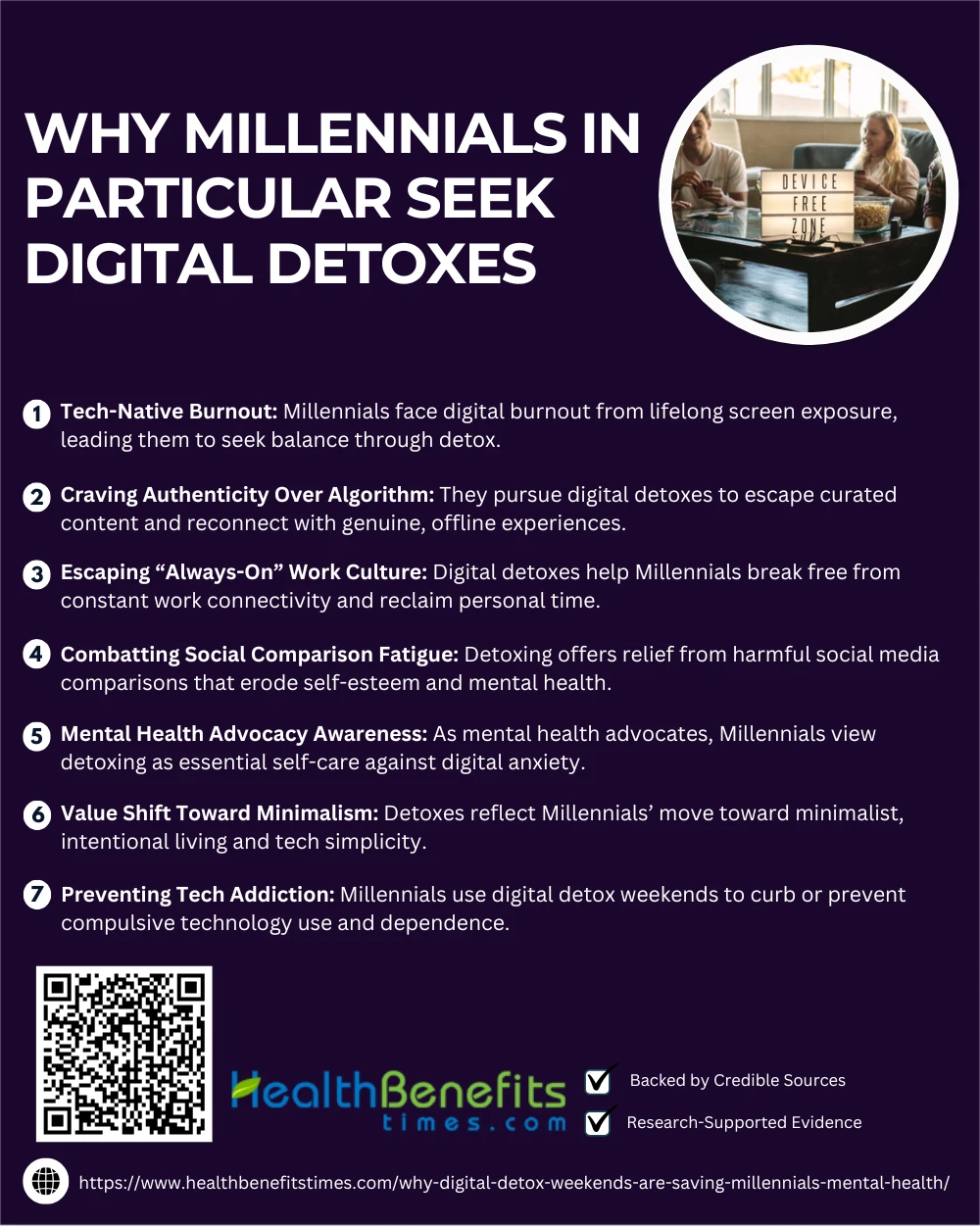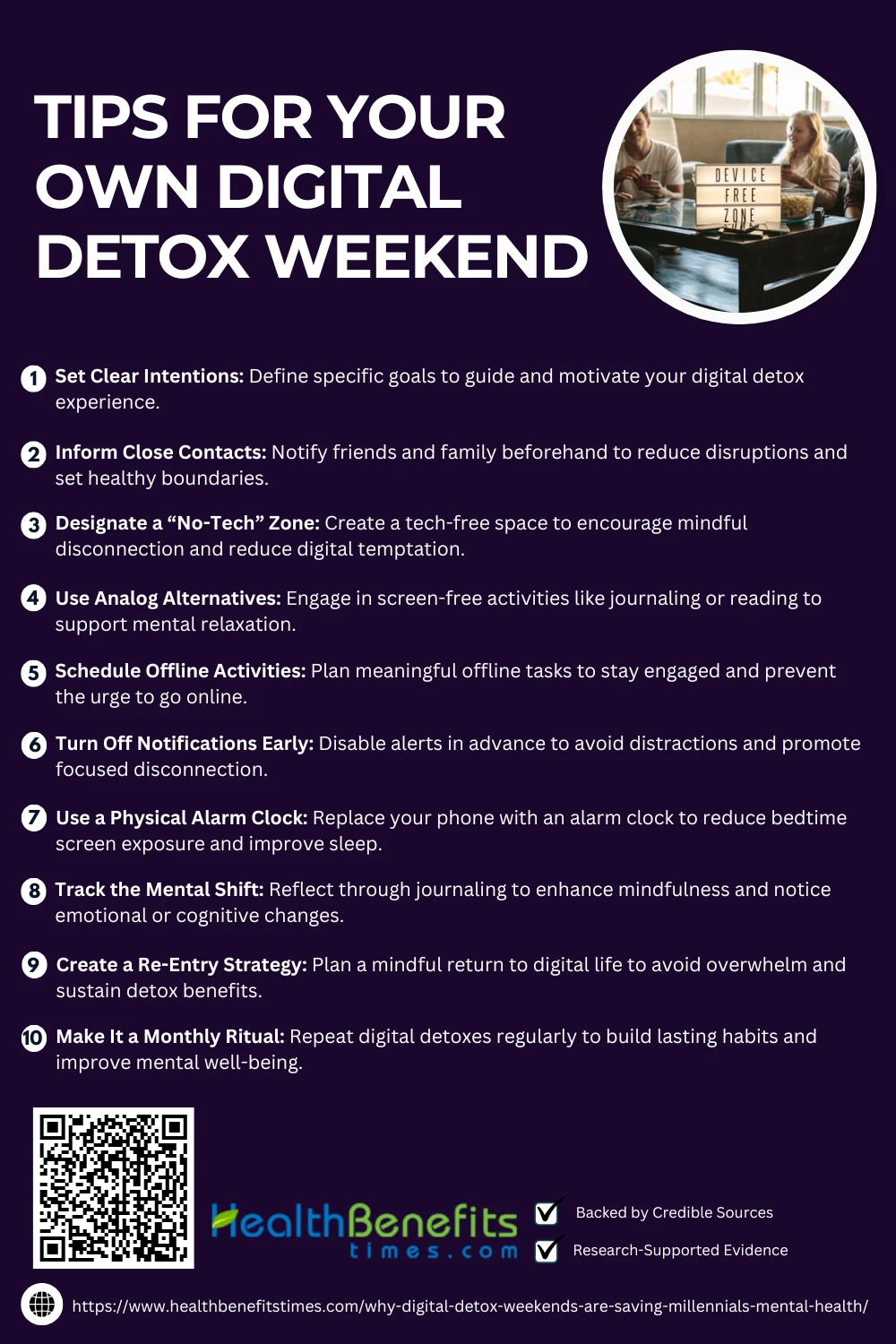- Digital Detox Weekends are short breaks where individuals unplug from all digital devices to recharge mentally and emotionally.
- These weekends are helping millennials reduce anxiety, improve sleep, and reconnect with real-world experiences.
- Stepping away from screens regularly supports better mental clarity, emotional balance, and overall well-being.
 Mental health refers to our emotional, psychological, and social well-being, affecting how we think, feel, and act, as well as how we handle stress and make choices throughout life. In an age dominated by constant connectivity and digital saturation, Millennials have found themselves increasingly vulnerable to stress, anxiety, and digital fatigue. With the rise in mental health challenges directly tied to excessive screen time, many have begun embracing Digital Detox Weekends—deliberate breaks from smartphones, social media, and screens—as a powerful form of self-care. These short-term disconnections allow individuals to reconnect with nature, reflect, and decompress, promoting mindfulness and improving emotional regulation. Research highlights that structured digital detoxes have shown measurable reductions in burnout and improvements in mental clarity among younger adults. Additionally, studies indicate that even brief mindfulness-focused tech breaks can bolster psychological resilience and decrease anxiety symptoms.
Mental health refers to our emotional, psychological, and social well-being, affecting how we think, feel, and act, as well as how we handle stress and make choices throughout life. In an age dominated by constant connectivity and digital saturation, Millennials have found themselves increasingly vulnerable to stress, anxiety, and digital fatigue. With the rise in mental health challenges directly tied to excessive screen time, many have begun embracing Digital Detox Weekends—deliberate breaks from smartphones, social media, and screens—as a powerful form of self-care. These short-term disconnections allow individuals to reconnect with nature, reflect, and decompress, promoting mindfulness and improving emotional regulation. Research highlights that structured digital detoxes have shown measurable reductions in burnout and improvements in mental clarity among younger adults. Additionally, studies indicate that even brief mindfulness-focused tech breaks can bolster psychological resilience and decrease anxiety symptoms.
What Is a Digital Detox Weekend?
A Digital Detox Weekend is a short-term, intentional break from digital devices—especially smartphones, computers, and social media platforms—to reduce stress and improve mental clarity. These weekends typically emphasize unplugging from the internet and screens while focusing on mindfulness, nature, journaling, and personal reflection. The primary components include technology disconnection, scheduled self-care routines, guided mindfulness exercises, and social reconnection in offline environments. According to a recent study, these detox weekends significantly enhance psychological well-being by encouraging reduced digital dependency and promoting balanced digital habits. (1)
Popular examples of digital detox retreats include Time to Log Off in the UK and Camp Grounded in California—both offer immersive, tech-free experiences combining nature, yoga, and creativity. These retreats are tailored to individuals seeking clarity, disconnection, and restoration through structured environments. (2) However, you don’t have to travel far—DIY alternatives such as device-free weekends at home, unplugged hikes, or journaling sessions with family or friends have also proven effective in restoring focus and emotional balance. (3)
What differentiates a successful digital detox is intentional disconnection—a conscious choice to detach for well-being—versus forced abstinence, which often leads to withdrawal-like stress or rebound bingeing. When the choice to disconnect is voluntary and aligned with wellness goals, participants are more likely to build lasting healthy habits and experience reduced digital anxiety. (4) Furthermore, such detoxes are most effective when supported by mindfulness and self-reflection strategies, as shown in mindfulness-based approaches to digital restraint. (5)
Mental Health Benefits of Digital Detox Weekend
Digital detox weekends offer a refreshing break from constant screen time, helping millennials reduce stress, improve focus, sleep better, and reconnect with themselves and others for improved mental well-being.
 1. Reduced Anxiety and Psychological Stress
1. Reduced Anxiety and Psychological Stress
Taking a break from digital devices for a weekend can significantly reduce anxiety and psychological stress by disrupting the overstimulation caused by screens. Studies show that even short-term disconnection lowers cortisol levels and mental fatigue. (6) Additionally, structured detoxes improve mood and create emotional breathing space. (3) Wellness experts emphasize that digital breaks enhance mindfulness and help combat chronic stress. (7)
2. Improved Emotional Regulation
Digital detox weekends help restore emotional balance by removing constant digital stimuli that can disrupt mood and cognitive stability. Research indicates that unplugging enhances self-awareness and emotional control through mindfulness and reduced overstimulation. (8) Meta-analyses show improved resilience and emotion regulation following tech breaks. (9) Additionally, detoxing interrupts negative emotional loops triggered by social media comparison and digital fatigue. (10)
3. Better Sleep Quality
A Digital Detox Weekend can significantly enhance sleep quality by limiting blue light exposure and reducing cognitive overstimulation from digital devices. Avoiding screens before bedtime allows melatonin levels to stabilize, leading to deeper, uninterrupted sleep. (7) Research also shows that digital detoxing improves sleep efficiency and sleep onset latency by reducing psychological stress. (11) Structured breaks from social media help reestablish healthy circadian rhythms. (9)
4. Enhanced Cognitive Clarity
Digital Detox Weekends restore cognitive clarity by giving the brain time to reset from digital overload. Unplugging reduces information fatigue, enhances working memory, and improves attention span. Mindful tech breaks have been linked to improved cognitive flexibility and better decision-making processes. (12) These benefits make digital detox a proactive strategy for cognitive rejuvenation in modern tech-intensive environments. (3)
5. Greater Self-Awareness and Mindfulness
Digital Detox Weekends support self-awareness and mindfulness by removing distractions and enabling deeper reflection. When participants disconnect from digital noise, they report heightened present-moment focus and internal clarity. Research on smartphone abstinence found increased mindfulness and conscious emotional regulation post-detox. (13) Intentional digital breaks promote self-inquiry, reduce mental clutter, and nurture introspective habits. (14) These effects contribute to lasting personal growth and improved psychological balance. (11)
6. Reduction in Digital Cravings and Dependency
Taking a digital detox weekend can interrupt compulsive smartphone behaviors and reduce digital cravings. Structured abstinence recalibrates dopamine-driven reward systems, lowering dependency on instant gratification platforms like social media. (6) Studies show that even a 72-hour detox leads to measurable reductions in withdrawal symptoms and digital anxiety. (8) Regular detoxes promote healthier digital habits and long-term behavioral regulation. (15)
7. Boosted Feelings of Well-Being and Satisfaction
Engaging in a Digital Detox Weekend can significantly elevate emotional well-being and overall life satisfaction by allowing individuals to reconnect with real-world experiences. Studies reveal that short-term digital disconnection boosts happiness, lowers stress, and enhances contentment levels. (11) Mindful abstinence from social media enhances subjective life satisfaction and social presence. A meta-review further confirms positive shifts in well-being metrics post-detox. (8)
Why Millennials in particular seek digital detoxes
Millennials often seek digital detoxes due to constant connectivity, work-life imbalance, and social media pressure. Escaping screens helps them regain focus, reduce anxiety, and restore their mental and emotional health.
Millennials, raised in the peak of the digital revolution, often experience tech-native burnout—a condition marked by screen fatigue, digital exhaustion, and information overload. Their overexposure to devices and online platforms leads to cognitive strain and emotional fatigue. (16) Research shows digital detoxing restores balance and focus. (17) (8)
2. Craving Authenticity Over Algorithm
Saturated with algorithmic feeds and curated content, Millennials increasingly crave genuine, unfiltered experiences. Digital detox weekends offer a break from manipulated digital realities and foster real-world presence. (11) This generation values authenticity over virtual performance, aligning with mindfulness and self-expression trends. (14) (18)
3. Escaping “Always-On” Work Culture
Millennials are increasingly turning to digital detox weekends to escape the pressures of the “always-on” work culture, where remote connectivity blurs work-life boundaries. Constant notifications and after-hours expectations drive burnout and emotional fatigue. Detoxing restores mental space and improves job satisfaction. (19) Disconnecting from work tech tools helps reclaim personal time and boosts overall well-being.
4. Combatting Social Comparison Fatigue
Endlessly scrolling through idealized portrayals on social media leads Millennials into social comparison fatigue—a psychological burden tied to self-worth erosion and envy. Digital detox weekends break this loop by removing algorithm-driven comparisons. (20) Studies show that intentional social media breaks reduce upward comparison and depressive symptoms. (21) Detoxing helps Millennials reclaim authentic self-identity.
5. Mental Health Advocacy Awareness
Millennials are driving mental health awareness globally, and digital detoxing has become a central part of their wellness advocacy. As digital natives, they are highly aware of screen-related stress and burnout, and increasingly promote tech breaks as a form of mental self-care. (20) Research confirms that mindfulness-based detoxes reduce digital anxiety. (21) Millennial advocates promote detoxing through social media health campaigns.
6. Value Shift Toward Minimalism
Millennials are embracing digital detoxes as part of a broader shift toward minimalism—prioritizing simplicity, intentional living, and mental clarity. Digital decluttering reflects their desire to reduce tech overstimulation and reclaim time and space. (20) Scholars frame detoxing as a gateway to digital minimalism and lifestyle sovereignty. (22) Minimalist values also align with ecological consciousness and mental sustainability. (23)
7. Preventing Tech Addiction
Millennials are proactively turning to digital detox weekends to prevent the onset or worsening of tech addiction. As heavy users of smartphones and social media, many recognize early symptoms of compulsive digital behavior and seek preemptive interventions. (20) Detox strategies reduce dependency and build mindful digital habits. (10) Structured unplugging even mitigates withdrawal symptoms and reinforces self-control. (24)
Tips for Your Own Digital Detox Weekend
Planning a digital detox weekend can be simple and rewarding. With a few mindful steps, you can unplug, relax, and recharge your mind away from screens and digital distractions.
Setting clear intentions is a foundational step for a successful digital detox weekend. Establishing specific goals—whether to enhance mindfulness, reconnect with nature, or reduce stress—provides motivation and structure. Research indicates that intention-setting boosts engagement and outcome efficacy during digital disconnection periods. (25) Mindfulness-based interventions also emphasize defined goals for technology disengagement. (5) Additionally, goal-oriented detoxing has been shown to reduce digital dependency. (11)
2. Inform Close Contacts
Notifying close contacts before a digital detox is vital to reduce stress and maintain healthy boundaries. Communicating this in advance sets expectations and fosters social understanding, crucial for uninterrupted mental rejuvenation. Studies suggest that such communication enhances the success rate of digital detoxes. Planning and boundary-setting also increase self-regulation and reduce anxiety about being offline. (26) Participants in structured detox programs report fewer disruptions when pre-informed boundaries are in place. (11)
3. Designate a “No-Tech” Zone
Creating a dedicated “no-tech” zone—such as a room or corner free from screens—can promote conscious disengagement from devices and enhance mindfulness. Research highlights that establishing tech-free spaces helps maintain digital boundaries and restore attention spans. These boundaries reinforce spatial cues for disconnection, and studies show that physical disconnection zones support intentional withdrawal from digital stimuli. (27) (28)
4. Use Analog Alternatives
Replacing screen-based activities with analog alternatives—like journaling, physical books, or drawing—encourages cognitive restoration and creative flow. One study revealed that participants using analog media during detoxes reported enhanced well-being and expression. (29) Offline leisure activities also reduce dependence on digital stimuli. (30) Journaling and physical engagement further ground users in mindful practice. (20)
5. Schedule Offline Activities
Scheduling offline activities such as hiking, journaling, or painting ensures engagement and helps avoid idle moments that may trigger digital relapse. These activities promote emotional grounding and mental restoration during detox weekends. (31) Nature-based practices are particularly effective at reducing screen cravings. (32) Purposeful engagement enhances overall detox success. (33)
6. Turn Off Notifications Early
Turning off notifications before a digital detox begins is critical in curbing reactive phone checking. Disabling alerts helps reduce psychological distractions and promotes mindfulness. (11) Researchers have found that pre-detox notification suppression enhances sustained focus and reduces anxiety triggers. (10) Preemptive digital boundaries allow participants to ease into disconnection more smoothly. (34)
7. Use a Physical Alarm Clock
Using a physical alarm clock instead of your phone reduces nighttime exposure to blue light and eliminates the temptation to scroll in bed. This simple change promotes deeper sleep and breaks the cycle of digital dependence. Experts highlight that phone-free mornings increase emotional control and presence. (11) Physical devices also enforce tech boundaries more effectively. (26)
8. Track the Mental Shift
Journaling or reflecting during a digital detox helps individuals notice subtle emotional and cognitive shifts, fostering long-term behavioral change. Researchers note that self-monitoring boosts mindfulness and metacognition during detox periods. (5) Tracking mood, thoughts, or productivity enhances self-awareness and detox effectiveness. (35) Documenting change also reinforces digital balance habits. (20)
9. Create a Re-Entry Strategy
To maintain the benefits of a digital detox, it’s essential to plan your re-entry into the digital world. Gradually easing back into screen use—starting with non-stimulating tasks—reduces overwhelm and prolongs clarity. (36) Re-entry rituals promote habit sustainability. (11) Mindful transition practices help reinforce intentional tech use. (20)
10. Make It a Monthly Ritual
Turning digital detox into a monthly ritual creates consistency and lasting psychological benefits. Regular unplugging fosters tech-boundary awareness and improves emotional balance over time. (11) Scholars emphasize that habitual detoxing aligns with minimalism and mental clarity goals. Monthly routines also aid in breaking long-term screen dependency. (37)
Long-Term Impact on Millennial Well-being
Digital detox practices have demonstrated profound long-term benefits for Millennial well-being, especially in addressing digital burnout, psychological strain, and attention fatigue. Longitudinal studies reveal that regular digital disconnection fosters increased emotional regulation, reduced anxiety, and enhanced cognitive clarity. (21) Millennials participating in detox retreats report sustained life satisfaction and stronger self-boundaries post-detox. (3) These effects are reinforced when detoxing is combined with nature immersion and analog rituals. (20) Detoxification also improves psychological resilience and helps prevent tech addiction relapse. (24) Over time, Millennials who ritualize tech breaks build sustainable digital habits and achieve better emotional balance. (32) Digital detoxing thus supports long-term mental clarity and mindfulness in a hyperconnected world. (38)
Conclusion
In an age of relentless notifications and digital noise, millennials are discovering the transformative power of digital detox weekends. By intentionally stepping away from screens, they’re reclaiming their mental space, improving sleep, reducing stress, and nurturing real-world connections. These breaks aren’t just about avoiding technology—they’re about prioritizing mental clarity and emotional well-being. As the pressures of modern life grow, regular tech-free weekends offer a sustainable way to reset and recharge. For millennials especially, embracing this mindful pause can lead to healthier habits and a more balanced life. It’s not about disconnection—it’s about reconnecting with what truly matters.



